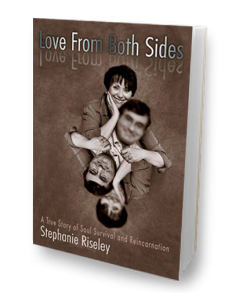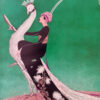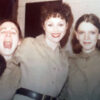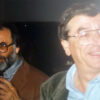I work with so many different kinds of clients; all come from different backgrounds and have different needs. To work with someone, they need to understand that I can’t control what life will “come up,” or what life will express itself, because there are too many to choose from!
I also need a willingness to continue on with the work, even if the “life” a client sees is completely boring or utterly horrifying. Because there’s not only one past life – it’s just the one that answers the question we’ve asked. That being said, lately, I have been getting so many Past Life Nazis that I needed to write this blog.
But first, I should say that my own direct past life was in Germany. I was a Rothschild-rich German Jewish doctor. A non-observant Jew, I was proud to be German. I was married to good Jewish wife (Jane, my best friend in high school in this lifetime) and I had a beautiful blond daughter (Lynn, my best friend since working at Disney in ’91). I also had a mistress – Greta, a showgirl. Blond, beautiful and amoral, she was jealous of my social standing and success. In this lifetime, she’s Octavio, a man I’ve been in love with for almost the last two years.
When I was 3, in this lifetime, I “saw” myself as a doctor, dressed in a long white lab coat, doing rounds. Through the years, I had “bleed-though” dreams and just assumed that I would become a doctor in my Stephanie lifetime. That didn’t happen. But in all of our lives, we are here to learn to love unconditionally, to find compassion and to forgive. And in my previous German lifetime, I died angry and bitter, because as I scrambled to get my family to safety, and tie up loose ends (I was German, after all), I wanted to make sure that my mistress was taken care of too, and so I told her about my plans to escape. She promptly turned me and my family over to the Gestapo in exchange for all of my property. In that lifetime, I died in the gas chambers of Auschwitz filled with a sense of betrayal and anger – never a good way to go! :^)
So, in this lifetime, my “soul-contract” with Greta/Octavio was to love him unconditionally and to forgive completely. And so I did. I loved him “unconditionally,” and on a soul level, which was the most authentic part of our relationship, I was able to accept him for who he is, and to forgive all. Now, when a “soul-contract” is completed, the soul work is finished and it’s time to move on. And so both Octavio and I have now moved on, the better for knowing each other. I will always love him, but I no longer need to be with him.
Soul work takes many forms. Sometimes people are born into “challenging saturations,” for “soul growth” reasons. Christina, a beautiful, 38 year old academic, from Latin America, has had one of those “soul growth” lives so far. She was born into a chaotic war-zone, to a stressed-out mother who rejected her, and to a father who abandoned the family soon after she was born. Then Christina married a man who betrayed her. At her wits end, she came to me find out “Why?” I don’t have the answers, but doing a Past Life Regression can put things in perspective. I ask my clients to write up their regression, so here’s exactly what she about her regression:
“Hans was born into a mixed family. His mother was Jewish and his father was Lutheran. He was born in Germany, and as a child, the family endured World War I. He was an only child and his mother was very protective of him. His mother was my friend Sarah in this life time (the woman who has also lovingly taught me to cook kosher meals, and observe by her side Jewish holidays).
“His mother had chosen to hide her religion. I could sense that the reason was related to some painful memories in Russia. Nevertheless, Hans was raised praying in Hebrew, knowing many of the principles of Judaism, and celebrating in hiding many of the holidays and rituals.
“Hans was an excellent student. He was also a very good son. When he reached young adulthood, out of fear, his mother gave him up to the German army. There, he continued to pretend not to be Jewish and began training as a soldier. I saw him wearing his first pair of army boots. I saw him training in the mud and snow. I saw him flying planes and learning to shoot. For a second, I saw him looking at himself in the mirror, and I saw my ex-husband when he was very young. I also saw him avoiding the front lines because he was afraid. Using his intellectual abilities so he wouldn’t have to witness and/or be part of the ugly side of combat, he worked his way up the administrative rankings and became a well-established officer. As a young man, he did not fully understand the evils of war. He was a very good strategist. He built a strong career with the German army.
“About fifteen years went by. It was the end of 1942. The tables were turning and the success of German military initiatives had started to fade. Hans was alone in a dark, elegant office wearing an impeccably clean uniform, which displayed various symbols and adornments. His desk was large and incredibly clean and organized. There were pictures of high-ranking officers in the walls. He looked sharp, powerful. He was tall, white skinned, short blonde hair, beautiful light eyes. He was cold. He was very lonely. His soul was destroyed, flooded with deep, dark shame. I thought: How can someone who looks that good feel so horrible? There was a very big discrepancy between his looks and how he felt inside.
“A table lamp lit a small stack of paperwork on the desk. He was sitting on his chair, staring at this stack for a long time. He needed to sign the top page but he didn’t have the courage. His signature would send yet another group of soldiers to the battle of Stalingrad, (a three-month battle that ultimately cost the German army 1/4 million soldiers). He had seen so much death, so much despair. He closed his eyes and the memories of him and other officers walking through the rubble of human parts, burned equipment, and decimated towns played in his mind – gruesome, grotesque, and inhuman. He knew this next group of soldiers was going to be massacred just as the groups before them. He thought of the recent news about the concentration camps. He thought about the Jews. He remembers touring a gas chamber. He now knew that the chambers were being used to exterminate Jews. He felt like a traitor. He thought of his mother and his father who fled to England. He knew that he would never see them again. He was discouraged, depressed, depleted.
“He recalled a childhood memory of him and his mom lighting candles during a religious ritual, in hiding in the attic of their home. He began to say the Hebrew prayer that he and his mom said that night. A voice in his head recited “Baruch Atah Adonai” – he mustered the strength to grab a fountain pen. “Barucha At Shekhinah” – he slowly signed his name at the bottom of the page as he cried through every word. He thought again of the consequences of that action. He thought that things were not supposed to have gone this far. I heard him think the words “unnotig” and “furchtbar” (unnecessary and dreadful) in different sentences. Reciting that prayer for this task further broke his spirit and as he wrote the date after his signature, he repeated the second verse in his head “Eloheinu Melech Ha-Olam”. And then he put his head down over his crossed arms and sobbed desperately but quietly over his pristine jacket.
“Shortly after, he deserted the German army, fleeing to Valparaiso, Chile. He boarded a ship carrying an old shoulder leather bag his father had made him to take to the army as a young recruit. He was wearing simple, humble clothing. Getting to the harbor was difficult but he escaped without any trouble. He gave the boat captain a small bag with money as he boarded the ship. I couldn’t see if he had a wife and children, which he presumably would have abandoned since he fled alone. The presence of his professional life was so powerful there was no room for personal matters.
“Once in Chile, he found his way rather quickly. He was welcomed with open arms. He was even admired by some. He turned to his father’s craft; shoemaking. He lived a quiet life, keeping his truth to himself. He did not take part on any public religious rituals of any kind. He ended his life by the side of a loving Chilean woman who had grown-up children living nearby. She loved him dearly and took care of him but never knew the story of his life or the meaning behind some of the trinkets he hid in his drawer.
“He died in a lovely home, on a bed a bit small for his large stature. Elegant white linens covered him. He felt the regret and anguish he felt in that dark office in 1942. As he took his last breath, he held a Star of David tightly on his right hand, over his heart, thinking of his mother.
“In the In-Between, he was deeply sorry. His regret was powerfully clear. He was welcomed with compassion but he didn’t accept it very well. When I asked him, What was the main lesson of that lifetime? He said, “Courage! Standing up for your beliefs.” He felt that he should have been punished for what his party did to his own people, the Jews, and for the many deaths of innocent men (Germans and other soldiers) under their command.
“The last I saw of him, he was a big sphere of shame and guilt. A group of souls was lovingly enveloping him.”
Experiencing that lifetime as Hans gave Christina a new perspective on the “challenges” she faces day to day in this life. Now she is ready to let go of the anger of her past, and open to loving and forgiving her mother and sister in this lifetime. But mostly it gives her an opportunity to accept and love herself more, and open up to loving others.
Courage and standing up for your own authentic beliefs, and not being swayed by the “social group” value system, can be difficult. We are social animals, after all. But not all “group-think” values are good for the soul. For my own German Jewish doctor self, I know that if I had “stood-up” to the Nazis, instead of selfishly just trying to protect myself and my family, I would have died proud.
And dying proud is what we’re all here to in this lifetime. We’re on this planet to make a difference.
So take a look at the life you’re living now. You can “future pace” to end of this lifetime, that is, imagine, visualize yourself as your own 86 year-old self, and decide that if what you’re doing today will make you proud. If not, then you can make a change today! The point of power is in the present, and there’s no time like now to begin! So begin your journey now. If I can help, please give me a call, okay?
If you like this blog, please share it, okay? Thanks!










